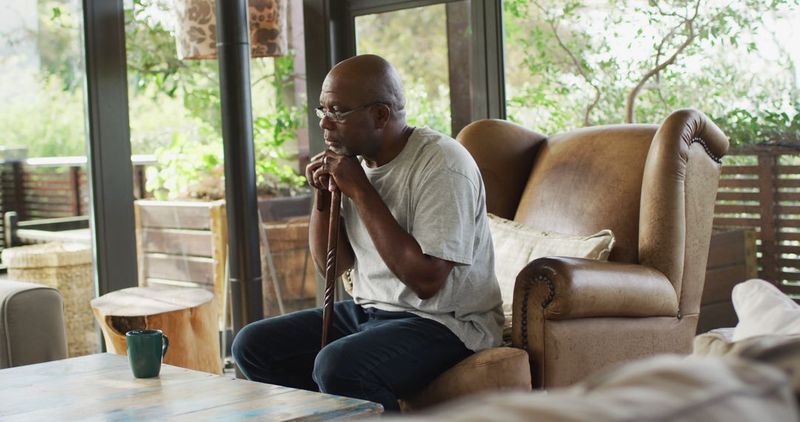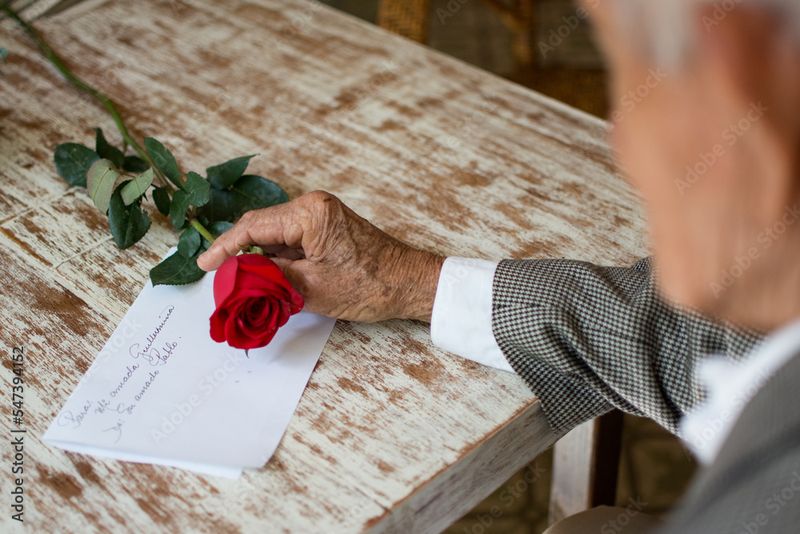22 Outdated Beliefs About Love That Often Hold Older Men Back
A lot of older men are still showing up to love with rules they never wrote—but were expected to follow. Be stoic. Lead the way. Never show weakness.
And now, those same rules are leaving them frustrated in relationships that feel confusing, distant, or one-sided.
Here are 22 outdated beliefs about love that might be holding them back—without them even realizing it.
1. Real men don’t show emotion.

Once upon a time, stoicism was the hallmark of masculinity. Men believed that hiding their emotions made them strong and resilient. But today, vulnerability is recognized as strength, not weakness. The old belief that ‘real men don’t show emotion’ makes forming deep connections nearly impossible. Emotional availability is the glue that holds relationships together.
Feelings are not a sign of weakness; they’re a language of the soul. Sharing emotions fosters intimacy and creates a bond based on understanding. Suppressing them, however, builds walls that even love struggles to breach.
Imagine a future where emotions flow freely, like a warm hug on a cold day. It’s time to embrace the full spectrum of human experience. Letting someone in requires more courage than shutting them out. So, start a new chapter where emotions are the bridge, not the barrier. Open up and watch love blossom.
2. The man should always lead.

Gone are the days when a man had to take the lead in every situation. In the past, this belief was intertwined with ideas of protection and strength. However, true partnerships thrive on balance and mutual respect. Letting go of the idea that ‘the man should always lead’ opens the door to shared experiences and growth.
In a relationship, leadership is not a one-way street. Sharing responsibilities and decisions strengthens the connection, making both partners feel valued. Dance as equals, with each taking turns to lead, creating a rhythm that only harmony can achieve.
By embracing equality, relationships evolve into dynamic partnerships where both voices matter. It’s not about control; it’s about collaboration. Step out of the old dance and into a new one, where every step is taken together, ensuring no one is left behind.
3. Women want to be taken care of.

The notion that ‘women want to be taken care of’ may stem from past societal norms. In reality, modern women seek partnership, not patronage. They desire to be seen for who they are, not managed or controlled. This belief can hold older men back from truly engaging with their partners as equals.
Women today are independent, capable, and strong. They appreciate gestures of care but value being respected as individuals. Partnerships thrive on mutual support, where both partners uplift and encourage each other.
By recognizing and respecting a woman’s autonomy, relationships can flourish. It’s about being there for each other, not being overbearing. See beyond outdated stereotypes, and connect on a deeper level, where each person’s individuality is cherished. Love grows when both partners walk side by side, respecting each other’s journey.
4. Once you’re married, you can stop trying.

Marriage is not the finish line; it’s the beginning of a lifelong journey. The belief that ‘once you’re married, you can stop trying’ can lead to stagnation and disconnect. A successful marriage requires continuous effort, nurturing, and commitment.
Love is like a garden that needs regular tending. Without care, it can wither and fade. Small gestures, thoughtful surprises, and shared adventures keep the spark alive. Marriage is about growing together, adapting to change, and supporting each other.
Don’t let the relationship go on autopilot. Embrace the continuous journey of love. Invest time and energy into each other, and watch as the relationship flourishes into something beautiful and enduring. Celebrate the milestones and cherish the everyday moments, for they are the building blocks of a lasting union.
5. Being a good provider is enough.

Being a good provider was once seen as the pinnacle of male responsibility. However, love requires more than just financial support. Emotional presence and effort are equally important, if not more. This outdated belief can hinder deeper connection and understanding.
Family and partners crave emotional engagement, not just physical comforts. Being present in moments big and small, sharing laughter and tears, and actively participating in family life enrich relationships beyond measure.
Rediscover the joy of being truly present. It’s the heartfelt conversations, the shared dreams, and the simple acts of kindness that create lasting bonds. Move beyond being just a provider, and embrace the role of a partner, a confidant, and a friend. True love is about being there in every sense of the word.
6. Jealousy proves you care.

Jealousy was once romanticized as a sign of deep affection. But in truth, it often masks insecurity and control. Believing that ‘jealousy proves you care’ can create mistrust and distance in a relationship.
True love is built on trust, not possession. Open communication and understanding form the foundation of healthy relationships. Instead of allowing jealousy to cloud judgment, focus on building trust and security through honesty and transparency.
Transform jealousy into a catalyst for growth. Discuss feelings openly and work together to build a partnership grounded in mutual respect and confidence. Trust is the bedrock of love, and when nurtured, it blossoms into a bond that no jealousy can threaten.
7. Talking about feelings is uncomfortable, so skip it.

Avoiding discussions about feelings is a common defense mechanism. The belief that ‘talking about feelings is uncomfortable, so skip it’ prevents authentic connection and understanding. Silence can create a gulf between partners that grows over time.
Embrace the discomfort and step into the world of emotions. Sharing feelings fosters intimacy and strengthens bonds. It’s in these vulnerable moments that relationships deepen and grow.
Instead of shying away, lean into the unease. Practice opening up, expressing emotions, and listening attentively. The rewards are profound: a partnership where both feel seen, heard, and valued. Transform silence into a language of love, where words become the threads weaving a tapestry of connection.
8. She should know how I feel—I don’t need to say it.

Assuming that love is understood without expression can lead to misunderstandings and feelings of neglect. The belief that ‘she should know how I feel—I don’t need to say it’ ignores the importance of communication in relationships.
Words have power. They can heal, comfort, and affirm. Expressing love through words and actions ensures that feelings are not just felt but acknowledged and appreciated.
Take the time to say ‘I love you,’ to write a note, or to express gratitude. These gestures reinforce the bond and keep the relationship vibrant. In a world filled with noise, let your words be the melody that keeps love alive. Show and tell, for it’s in the expression that love truly thrives.
9. Physical intimacy is the main way men connect.

The belief that ‘physical intimacy is the main way men connect’ reduces intimacy to a physical act, overlooking the profound emotional connection that can exist between partners. While physical intimacy is important, emotional intimacy is the cornerstone of lasting relationships.
True connection involves sharing dreams, fears, and aspirations. It’s about being present and supportive, creating a safe space where both partners can be themselves.
Focus on building emotional bridges. Engage in conversations, share experiences, and cultivate a relationship where intimacy transcends the physical. Celebrate the moments of closeness that come from understanding and empathy. Let love be the dance of both body and soul, where every step brings you closer.
10. A woman should be happy if she’s taken care of.

The idea that ‘a woman should be happy if she’s taken care of’ overlooks her need for connection and companionship. Security without emotional engagement leaves relationships feeling hollow and unfulfilled.
Women desire to be heard, understood, and cherished as equals. It’s the emotional connection, not just the comforts provided, that truly nurtures happiness and fulfillment.
Invest in moments that matter. Listen, engage, and show interest in her thoughts and dreams. Create a partnership where both feel valued and appreciated. Move beyond traditional roles and embrace a relationship where happiness is shared, nurtured, and celebrated together.
11. You don’t need to talk about the past—it’s over.

The past holds memories, lessons, and sometimes unresolved pain. Dismissing it with the belief that ‘you don’t need to talk about the past—it’s over’ can prevent healing and growth.
Embrace the past as a tapestry of shared experiences. Discussing it openly allows for understanding, forgiveness, and deeper connection. It’s in these reflections that relationships find resilience and strength.
Turn past shadows into light by acknowledging and addressing them. Share stories, learn from mistakes, and let the past be a guide, not a ghost. Create a relationship where every chapter is honored, and every experience is a stepping stone to a brighter future together.
12. You don’t apologize if you didn’t mean to hurt her.

Intentions and impact don’t always align. The belief that ‘you don’t apologize if you didn’t mean to hurt her’ can hinder resolution and healing. Acknowledging the hurt, regardless of intent, shows empathy and care.
Apologies are bridges to understanding. They demonstrate willingness to listen and grow. By accepting responsibility, relationships can move past hurt and rebuild trust.
Approach apologies with sincerity and openness. Listen to the feelings behind the words, and let healing begin. Let the act of apologizing be a testament to your love and commitment. It’s not about being right; it’s about being connected.
13. It’s her job to keep the relationship emotional.

The responsibility of emotional maintenance doesn’t fall solely on one partner. The belief that ‘it’s her job to keep the relationship emotional’ overlooks the mutual effort required for a thriving partnership.
Both partners must contribute to the emotional landscape. Sharing thoughts, emotions, and dreams creates a rich tapestry where both feel valued and understood.
Take initiative in nurturing the emotional connection. Plan thoughtful surprises, engage in meaningful conversations, and show appreciation regularly. Together, create a relationship where both partners are active participants in the dance of love and understanding.
14. If you’re not yelling, you’re not fighting.

Arguments don’t need to be loud to be effective. The belief that ‘if you’re not yelling, you’re not fighting’ can lead to misunderstandings and unresolved conflicts. Silence, too, can be damaging if it signifies avoidance.
Conflict is an opportunity for growth when approached with respect and calmness. Discussions should focus on understanding, not winning. By speaking and listening with empathy, solutions become clear and relationships strengthen.
Practice calm communication. Approach disagreements with an open heart and mind. Let silence be a space for reflection, not repression. In the quiet moments, find clarity and resolution. Let love be the anchor that guides you through the storms of conflict.
15. It’s weak to admit you need help.

Asking for help is not a sign of weakness but rather a testament to strength and self-awareness. The belief that ‘it’s weak to admit you need help’ can isolate individuals and prevent growth.
Reaching out for support fosters connection and understanding. It shows a willingness to learn and evolve. In relationships, mutual support and vulnerability create bonds that are unbreakable.
Embrace the courage to seek guidance. Whether it’s a professional, a friend, or a partner, let help be the path to healing and strength. Together, navigate life’s challenges with grace and resilience. Let vulnerability be the key that unlocks doors to deeper understanding and love.
16. You don’t show vulnerability—it’s unattractive.

Vulnerability is often misconstrued as unattractive or weak. However, it is the very essence of authenticity and trust. The belief that ‘you don’t show vulnerability—it’s unattractive’ can create barriers in relationships, preventing genuine connection.
Sharing vulnerabilities opens the heart and invites others in. It’s within these tender moments that love truly blossoms, fostering an environment where both partners feel safe and accepted.
Celebrate vulnerability as a strength. Let it be the bridge to deeper understanding and connection. In relationships, showing your true self is not only attractive but essential for a lasting bond. Let love be the gentle embrace that welcomes every facet of who you are.
17. Saying ‘I love you’ all the time makes it lose meaning.

Some believe that frequent expressions of love dilute their significance. However, saying ‘I love you’ doesn’t lessen its meaning; it reinforces the bond and keeps the connection alive.
Words of affirmation are the daily reminders that strengthen relationships. They provide reassurance, comfort, and joy. Love, like a garden, thrives on constant nurturing and attention.
Express love regularly and sincerely. Let it be the melody that enriches the symphony of your relationship. Whether whispered in the quiet of the night or shouted from the rooftops, let ‘I love you’ be the heartbeat of your connection, pulsing with warmth and devotion.
18. Boundaries are for people who can’t handle real relationships.

Boundaries are essential for healthy relationships. The belief that ‘boundaries are for people who can’t handle real relationships’ ignores their role in maintaining respect and individuality.
Boundaries define personal space and create a safe environment where both partners feel valued. They foster mutual respect and prevent overstepping, ensuring that love is both giving and receiving.
Embrace boundaries as tools for growth. Discuss them openly and adjust as needed. Let boundaries be the framework that supports your relationship, allowing it to flourish without fear of intrusion. In respecting limits, find freedom and understanding.
19. Marriage should feel the same forever.

The belief that ‘marriage should feel the same forever’ overlooks the natural evolution of love. Relationships grow and change, reflecting the journey of life and shared experiences.
Embrace the ebb and flow of emotions and circumstances. Celebrate the transformations and adapt to changes, for they are the threads that weave the tapestry of a lasting relationship.
Let love be a dynamic force, adjusting and thriving with life’s seasons. Cherish the memories and look forward to new adventures. In the dance of life, let marriage be the enduring partnership that celebrates growth and change as the essence of lasting love.
20. If it’s meant to be, it’ll work itself out.

Relying on fate can prevent proactive engagement in a relationship. The belief that ‘if it’s meant to be, it’ll work itself out’ takes away from the effort required to nurture love.
Relationships thrive on attention, care, and dedication. Taking an active role in your partnership ensures that love continues to grow and evolve.
Don’t leave love to chance. Invest in each other, communicate openly, and cherish the moments you create together. Let love be the journey you embark on with purpose and passion, ensuring it remains vibrant and fulfilling.
21. Love is Only for the Young

Who says love is reserved for the young? Love knows no age boundaries. Older men often believe that romance fades as years go by, but that’s far from the truth. A shared sunset, laughter over a meal, or simply holding hands can reignite passion.
As people age, emotional connections become richer, offering wisdom and depth. Discarding the notion that love fades with age opens doors to endless possibilities. Love’s beauty is timeless, available to anyone willing to embrace it.
True romance thrives at any age, proving love can blossom in the autumn of life.
22. Men Should Hide Their Vulnerabilities

Vulnerability is often mistaken for weakness, especially among older generations. Expressing feelings and fears can actually strengthen bonds. A deep conversation in a cozy setting reveals the courage it takes to be truly open.
When men embrace their softer sides, they foster trust and empathy in relationships. Vulnerability, rather than being a flaw, is a bridge to genuine connection.
By shedding the cloak of invincibility, men build deeper, more meaningful relationships. Being vulnerable is not just about sharing fears; it’s about embracing authenticity and inviting love with open arms.






